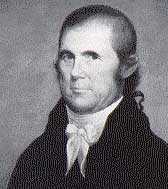Related Topics
...Ratification, Bill of Rights and Other Amendments
The 1787 Constitution lacked a Bill of Rights. Few except Madison himself were opposed to adding one, but many other delegates would have failed election without promising it. Negotiations at the Convention had proved so excitingly innovative that time ran out before the Convention had to adjourn with only a promise of a Bill of Rights, first thing.
Philadelphia Legal Scene
The American legal profession grew up in this town, creating institutions and traditions that set the style for everyone else. Boston, New York and Washington have lots of influential lawyers, but Philadelphia shapes the legal profession.
Reminiscences
"The past is never dead. It's not even past." -- William Faulkner, Requiem for a Nun
Federalism Slowly Conquers the States
Thirteen sovereign colonies voluntarily combined their power for the common good. But for two hundred years, the new federal government kept taking more power for itself.
...Pending and Later Amendments
New topic 2012-08-01 19:06:55 description
Seventeenth Amendment

|
| Seventeenth Amendment |
The Seventeenth Amendment of the Constitution provides for the direct election of U.S. Senators; prior to that, the states could decide for themselves how to select their Senators. The Amendment was proposed in 1912 and ratified in 1913. Today, most people have no opinion whether the Amendment was good or bad, necessary or unnecessary. The Progressives of 1912 professed to be shocked, shocked, that wheeling and dealing went on in the state legislatures every time there was a vacancy in the Senate. Indeed, few contestants on TV quiz shows would be able to tell you what the Amendment was about. It would be hard to find a person who would, without further study, be opposed to a reaffirmation of "The Senate of the United States" shall be composed of two Senators from each State, elected by the people thereof, for six years; and such Senators shall have one vote. The electors in each State shall have the qualifications requisite for electors of the most numerous branch of the State legislatures."
If you search for reasons -- why in the world would there be a fuss about this topic, 125 years after the "Constitutional Convention -- several plausible reasons are stated, all of them amounting to legislature incompetence. Such as deadlocks resulting in vacancies remaining unfilled, influence by corrupt political organizations and special interests through the purchase of legislature seats, and neglect of duties by legislators because of politics. Even though news of these matters has failed to persist in the national recollection, they seem plausible enough; it sounds like local politics, all right. But the plausibility was there in 1787, too, and surely the founding fathers expected something like that when they let the States select their Senators as they pleased. The whole idea surely was to give the states additional reassurance that they could block any further transfer of state power to the federal government; direct election of senators clearly reduced the power of state governments in the federal/state struggle. Mostly, of course, by the State Legislators selecting one of their own members to go to Washington.

|
| John Marshall |
We have here a tilting of our governance from a Republic toward a Democracy, following the philosophy of John Marshall, of all people, that the behavior of all State legislatures everywhere will inevitably lead to mischief. Just a minute, please, let's give this a little thought. Surely the vast amounts of campaign money required to run for a Senate seat compare with the amount a special interest would have to spend to buy a majority in the Legislature of a State. As a practical matter, most special interests have lost interest in State politics and spend their money in Washington -- except for those few special interests that are exclusively State regulated. This comes down to the insurance and real estate industries, with insurance only there because of the McCarran Ferguson Act. This isn't only because of the Seventeenth Amendment, it also has to do with Franklin Roosevelt's Court-packing attempt, which is discussed elsewhere.

|
| " Plato" using Leonardo da Vinci as model. |
The idea of a Republic, originally set down by the Greek philosopher Plato, was that a small group of elite philosophers (you will have to forgive his professional biases) who meet together occasionally, would be better able to pick a member of their group for higher responsibilities, than would the populace. The inner circle would know who was an alcoholic, a phony, a pervert, a coward or a loafer, whereas these qualities can be concealed from mass audiences long enough to get elected. Such an in-group in a legislature may pick a bad person, or deliberately reject a good one, but they do it on purpose, not because they are fooled. The issue of direct election of Senators comes down to whether you think it is more likely that a legislature will be corrupt, or the voting population will be ignorant. Hard choice.
Meanwhile, election to the State legislature has been reduced to an inconsequential backwater, almost guaranteed to have an adverse effect on the members. There was a time when people who wanted to be U.S. Senator knew they must first run for the Legislature, where their skills could be tested and perfected. National affairs became State affairs, with legislators well aware that they could unseat a Senator whose national behavior displeased them. There are many States, Pennsylvania among them, who collectively pay far more federal taxes than they receive in federal benefits. Call it pork barrel if you like, the present degree of interstate wealth redistribution could not possibly continue at present levels if we repealed the XVII Amendment.
Originally published: Friday, June 23, 2006; most-recently modified: Friday, August 09, 2019
| Posted by: G4 | Feb 23, 2009 7:21 AM |
| Posted by: TomATS | Feb 20, 2009 9:30 AM |